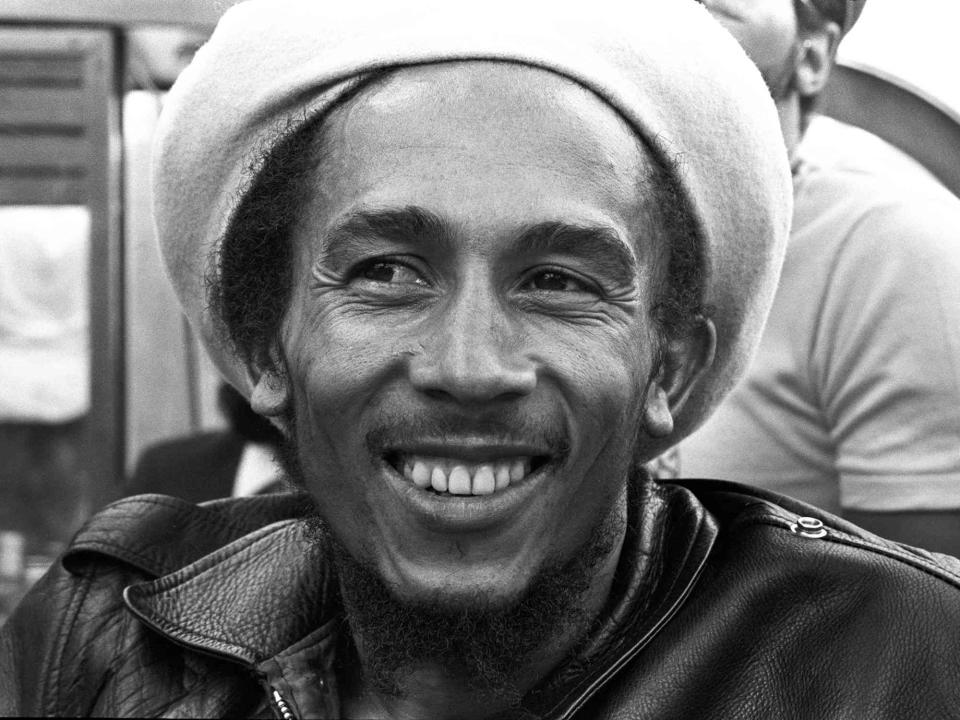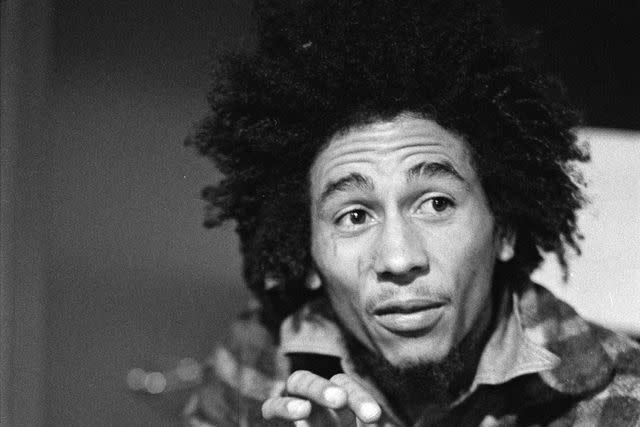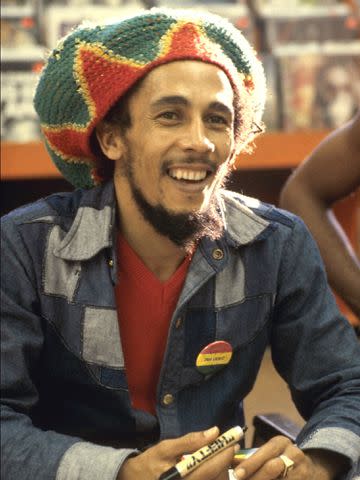What to Know About Bob Marley's Song 'One Love'
- Oops!Something went wrong.Please try again later.
- Oops!Something went wrong.Please try again later.
The iconic song from Bob Marley and the Wailers' 'Exodus' inspired the title of the new biopic 'Bob Marley: One Love'

Gijsbert Hanekroot/Redferns
Bob Marley in Amsterdam, Netherlands in 1976A great deal of Bob Marley’s legacy can be boiled down to one of his most beloved songs: “One Love.”
Like “Could You Be Loved” and “Jamming,” it’s among the late music icon’s most iconic tracks, and with lyrics like, “One Love! What about the one heart? One Heart,” and, “Let's get together and feel alright,” captures the peaceful message he was famous for.
The song and its resonant lyrics so greatly encapsulate the Jamaican musician that it as the inspiration for the title of the all-new biopic about him, Bob Marley: One Love, which arrived in theaters on Wednesday. The film, which was produced in partnership with the Marley family and directed by Reinaldo Marcus Green, stars Kingsley Ben-Adir as the reggae artist and chronicles his journey creating revolutionary music and spreading a message of love and unity.
Here is everything to know about Bob Marley’s “One Love.”
Related: Bob Marley's Coolest Throwback Photos
When was "One Love" written?
“One Love” was originally released in 1965 by Marley’s group The Wailers on their debut album The Wailing Wailers. Much more lo-fi and ska-and-rocksteady-sounding than the version fans are familiar with off 1977’s Exodus, according to History, the original song was penned by the singer-songwriter as he was immersing himself in the Rastafari faith.
After growing up Catholic, in the ‘60s, Marley embraced the religion that came to prominence in Jamaica in the 1930s and believed in Ethiopia as a holy land, the liberation of the African diaspora from colonialism, concepts favoring peace and love, among other pillars, per Britanica. That practice influenced the song’s lyrics.
After being rerecorded as a part of the 1970 medley “All in One,” the song in its most iconic state was recorded and released as “One Love/People Get Ready" on the classic 1977 album Exodus, which is credited to Bob Marley and The Wailers. The famed version slows down the track, brings Marley’s lyrics to the forefront and adds back-up vocalists to emphasize the inspirational lyrics and takes on a much heavier reggae sound. As the track included an interpretation of The Impressions song “People Get Ready,” the song title was adjusted as such and Curtis Mayfield received a songwriter credit.

Michael Putland/Getty
Bob Marley in May 1973How did "One Love" perform on the charts?
Although Exodus charted on the Billboard 200 in the U.S., “One Love/People Get Ready” never actually charted in the States.
In the U.K., the song was a success and peaked at No. 5 on the Singles Chart in 1984 when it was officially released as a single. (Exodus also reached the top 10 on the Albums Chart upon its release in 1977.) Over the years with various releases, the reggae track has resurfaced on the chart again.
In 2007, the original 1965 track received a coveted honor from the Recording Academy when it was inducted to receive a hall of fame award, which honors songs of historical significance after they are at least 25 years old.

Chris Walter/WireImage
Bob Marley at Tower Records Hollywood in 1979"One Love" as Bob Marley's philosophy
“One Love/People Get Ready” contains a message of hope that in unifying and coming together, change can be made for the better and any obstacle can be overcome. It’s an empowering, optimistic view that Marley carried throughout much of his life as an artist and activist.
The song took on an especially political meaning when Marley returned home to a particularly turmoiled Jamaica from London in 1978 after he fled the country following an assassination attempt in.
According to History, the “Buffalo Soldier” artist was convinced by gang leaders from the opposing political parties Jamaican Labour Party and the People's National Party, who were both corrupt and creating a divided nation, to come back and play what became known as the One Love Peace Concert. At the event, he famously held the hands of the leaders of the two parties on stage in an act of resistance and at the urging of unity. Although political division continued in the nation, the moment signifies how much of a peacemaker Marley was at the time and is remembered as part of his legacy.
For more People news, make sure to sign up for our newsletter!
Read the original article on People.

